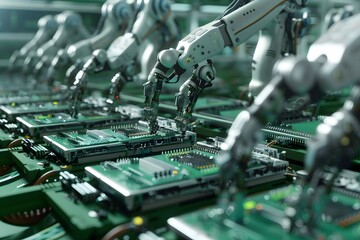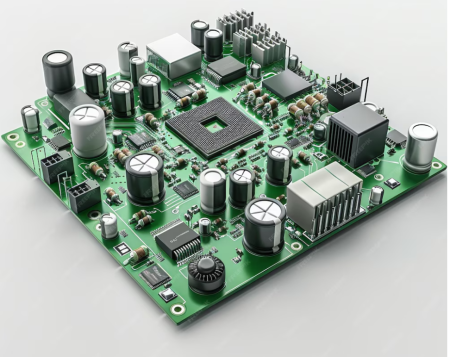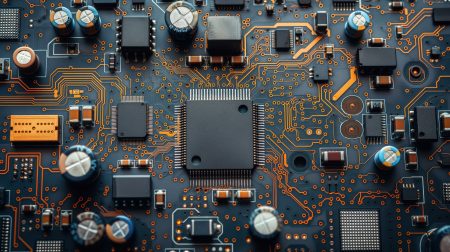- +86-755-23012705
- Building 3, Jinfeng Industrial Park, Fuyong Street, Baoan District, Shenzhen ,China
- [email protected]
As we enter the age of artificial intelligence (AI), industries worldwide are witnessing transformative changes. PCBA (Printed Circuit Board Assembly) prototyping factories are no exception. The integration of AI technologies offers significant opportunities to enhance productivity, reduce costs, improve quality, and optimize customer experiences. In this blog, we will explore how PCBA prototyping factories can embrace the AI era and thrive in this evolving landscape.
One of the most impactful ways AI can be leveraged in PCBA prototyping is through the automation of production processes. Smart robotics and automated systems can take over repetitive tasks such as component placement, soldering, and inspection. This not only speeds up production but also reduces human error.
For instance, AI-driven machines can adapt to variations in component sizes and types, ensuring consistent quality across different batches. By automating these processes, factories can also free up skilled labor to focus on more complex tasks, ultimately enhancing overall efficiency.

Quality assurance is crucial in PCB assembly, where even minor defects can lead to significant operational failures. AI can revolutionize quality control through advanced image recognition and machine learning algorithms. Traditional inspection methods often rely on manual checks, which can be subjective and prone to error.
With AI, factories can implement automated inspection systems that analyze products in real time, identifying defects with high precision. These systems can learn from previous data, continuously improving their accuracy and reducing false positives. This proactive approach to quality control can lead to higher customer satisfaction and fewer returns.
AI excels at processing and analyzing large amounts of data, making it an invaluable tool for decision-making in PCBA prototyping. By collecting data from various sources, such as production processes, quality checks, and market trends, factories can gain insights that drive strategic decisions.
For example, predictive analytics can help factories forecast demand, allowing them to adjust production schedules accordingly. By analyzing historical data, AI can identify trends that inform inventory management, reducing excess stock and minimizing costs.
In today’s market, customers increasingly seek personalized solutions tailored to their specific needs. AI can help PCBA prototyping factories offer more customizable services. By analyzing customer preferences and historical orders, AI can recommend design adjustments and optimize production processes to meet unique requirements.
Additionally, AI can facilitate agile manufacturing practices, enabling factories to quickly pivot between different product lines. This flexibility allows for rapid response to changing market demands, giving companies a competitive edge.

Downtime due to equipment failure can be a major setback for PCBA prototyping factories. Implementing AI for predictive maintenance can significantly mitigate this risk. By monitoring equipment performance and analyzing operational data, AI systems can predict when maintenance is needed before a breakdown occurs.
This proactive approach not only minimizes unexpected downtimes but also extends the lifespan of equipment, leading to cost savings. Factories can operate more smoothly, maintaining production schedules and meeting delivery deadlines.
As AI technologies are integrated into production processes, the workforce will require new skills. It’s essential for PCBA prototyping factories to invest in training and upskilling their employees. By providing training on AI tools and data analysis, workers can become adept at using these technologies effectively.
Creating a culture of continuous learning will empower employees to adapt to technological advancements, ensuring that the workforce remains competitive and capable of harnessing the full potential of AI.
Embracing AI is a collaborative effort. PCBA prototyping factories should consider partnerships with technology providers and research institutions to stay at the forefront of AI developments. These collaborations can facilitate knowledge sharing, access to cutting-edge technologies, and insights into best practices.
By leveraging external expertise, factories can accelerate their AI adoption journey and implement solutions that are tailored to their specific needs.

The AI era presents a wealth of opportunities for PCBA prototyping factories to enhance their operations and better serve their customers. By automating production processes, implementing smart quality control, leveraging data for decision-making, enhancing customization, and focusing on predictive maintenance, these factories can significantly improve efficiency and competitiveness.
As the landscape of electronics manufacturing continues to evolve, embracing AI technologies will be crucial for PCBA prototyping factories aiming to thrive in this new environment. With the right strategies and a commitment to innovation, these factories can navigate the challenges of the AI era and emerge as leaders in the industry.
Make Your PCB Dreams a Reality with XPCB Limited
XPCB Limited is your go-to partner for turning your PCB dreams into reality. Our streamlined PCB manufacturing process, combined with quick-turnaround prototyping and turnkey PCBA services, ensures that your projects come to life with ease. Trust in our expertise and dedication to quality as we help you achieve your PCB goals. Join us and experience the difference with XPCB Limited.






XPCB Limited is a premium PCB & PCBA manufacturer based in China.
We specialize in multilayer flexible circuits, rigid-flex PCB, HDI PCB, and Rogers PCB.
Quick-turn PCB prototyping is our specialty. Demanding project is our advantage.
Tel : +86-136-3163-3671
Fax : +86-755-2301 2705
Email : [email protected]
© 2024 - XPCB Limited All Right Reserve
